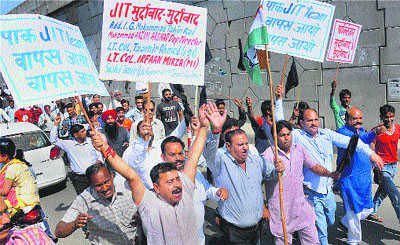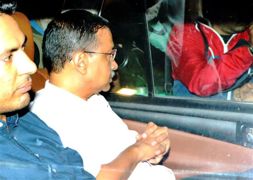
Pak JIT’s visit to Pathankot may yield nothing.
Gen VP Malik (Retd)
CRICKETERS believe that if India and Pakistan were to play more games, it would help both countries to live in peace. They do not realise that at political and diplomatic levels too, both nations play games. This game is called one-upmanship, with surprise as an important element.
Lately, this game has become frequent and intense. We had both prime ministers speaking to each other in whispers in Paris. That was followed by national security advisers and foreign ministers breaking bread with their counterparts. On Xmas day, Prime Minister Modi scored huge points with a surprise stopover in Lahore to greet his counterpart. A week later, Pakistani Jaish-e-Mohammad (JeM) fidayeen surprised us with a daring attack on the IAF air base in Pathankot. Now, it is the turn of intelligence agencies. While India hosts Pakistan’s Joint Investigation Team (JIT), Pakistan is hosting and feting (appears that way in the TV clip released by Pakistan) a former Indian Naval officer as a spy.
The JIT visit to the Pathankot airbase will neither compromise our security nor make any dent on Pakistan’s policy of cross-border terrorism. On the plus side, it may lead to matching reciprocity and a small diplomatic advantage. On the minus side, China blocking India’s move to place ban on JeM chief Azhar Masood, the mastermind of the Pathankot terror attack, makes it obvious that Pakistan will take no action against him and his terror outfit. The Lashkar and Jaish perpetrators may feel encouraged with India’s soft, ethical response, which like the 26/11 case will lead nowhere. All this will carry some political cost for the Modi government within India.
The spy episode is intriguing, in the revealed details as well as its timing. The revealed details — former Naval Commander Jadhav’s presence in Baluchistan with an Indian passport, his video recorded confession and demeanour — are most unprofessional (for a spy) and unconvincing. Pakistani ‘respect’ for such a spy is hard to believe. I cannot forget the horrible treatment meted out to Capt Saurabh Kalia’s patrol in Kargil, and of Indian soldiers captured elsewhere.
Its timing and publicity too raises questions. Was it timed by the Pakistani security establishment to force Sharif’s hand on Modi-Nawaz talks scheduled in Washington? Three days after the spy episode, Nawaz Sharif called off his Washington visit due to Easter Sunday’s terror incident in Gulshan-e-Iqbal Park, Lahore. Was it to cover its intelligence failure in the Easter terror attack? Or to scuttle joint investigation post Pathankot incident?
How will these tactical incidents impact Indo-Pakistan relations or India’s Pakistan policy? For this, we need to coldly assess what is happening within Pakistan.
From all accounts, it is evident that the Pakistan army remains Indo-centric and in control of Pakistan’s engagement with India. It challenged the Indo-Pakistan joint statement at Ufa, which gave primacy to counter- terrorism in our disputes. It forced the government to change tack and make Kashmir the number one agenda point. In recent months, it has been obsessed with ‘Indian interference in Baluchistan’.
A few days ago, the director-general of Inter-Services Public Relations, Lt Gen Asim Bajwa, had said Gen Raheel Sharif, Pakistan army chief, had shared his concern with Iranian President Rouhani that ‘RAW is involved in Pakistan, especially in Baluchistan, and sometimes it also uses the soil of our brother country Iran’. Such a discussion was promptly denied by the Iranian President and Iran’s ambassador in India.
On March 31, 2016, a well-known Pakistan daily wrote that Asim Bajwa’s recent tweets and statements have exposed civil-military tensions. The report observed “This situation tends to undermine the civilian supremacy as guaranteed by the constitution and gives the impression as if the military is acting like a supra-governmental body over and above the country’s chief executive.”
When Pakistan introduced the anti-terror National Action Plan (NAP) and amended its constitution, apex committees (ACs) were created to supervise the implementation of NAP. The ACs are dominated by army officers and have become another irritant in Pakistan’s civil-military relations.
As evident from the Easter terrorist attack in Lahore which claimed 74 lives, mostly Christian women and children, the sectarian divide within Pakistani heartland has increased considerably. The Sunni ultras were targeting Shias and Ahmadiyyas for some time. Now, armed with blasphemy laws, the Sunni majority has begun to terrorise Pakistan’s religious minorities also.
In 2011, when Malik Mumtaz Hussain Qadri killed his boss Salman Taseer, Governor of Pakistan Punjab, for defending a Christian woman who had fallen afoul of Pakistan’s blasphemy laws, he became a hero. A mosque was named after him in Islamabad. People came to see him in prison to seek his blessings. The judge who sentenced him to death had to flee the country. When Qadri was hanged, despite media blackout, over 1,00,000 people poured into the streets of Rawalpindi to bid him farewell. Describing that spectacle, well-known author Aatish Taseer, writing in The New York Times, observed that the ideology of hate had infected the body of the (Pakistani) people. “What do you do when the madness is not confined to radical mosques and madrasas, but is abroad among a population of nearly 200 million?” Last week, Qadri’s supporters launched another agitation outside Pakistan’s Parliament House and other key installations. Led by the Sunni Tehreek and Tehreek-i-Labbaik-Ya-Rasool, over 25,000 supporters demanded the implementation of Sharia in Pakistan and Qadri to be declared a martyr!
It is evident that the current Pakistani political leadership is sandwiched between the Pakistan army with its vice-like control over national security policies, and the growing Islamist militant and non-militant movements. Both of them see India as an adversary — for common as well as some different reasons.
Atal Bihari Vajpayee once said: “Over the last 55 years, every initiative for a dialogue with Pakistan has invariably come from India.” This statement reflected India’s frustration in its endeavour to develop good neighbourly relations with Pakistan. While there is no alternative to remaining engaged with such a geographical neighbour, dramatic gestures or a few summit meetings with its sandwiched political leadership are unlikely to bring lasting peace.
When diplomacy does not work, changes in the psyche and attitude of nations occur through all-out conflicts and/or economic disparities. Since an all-out conflict with Pakistan is ruled out, India must focus on the economic strategy. Meanwhile, it would have to live with the ugly stability and reciprocal violence. One must hope for the best in a gradual, incremental dialogue process, but remain prepared and alert for the worst.
— The writer is a former Army Chief



























